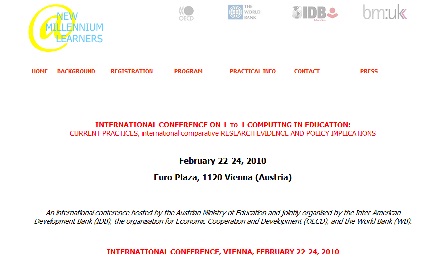Praktisch unbemerkt von meinem Informationsradar findet kommende Woche in Wien eine interessante Konferenz zu
One-To-One-Computing in education (
Biblionetz:w02173) statt, veranstaltet u.a. von der Weltbank und der OECD, gehostet vom Österreichischen Bildungsministerium. Nicht nur die Veranstalter entsprechen nicht den üblichen Verdächtigen aus dem edutech-Kuchen, auch die
Website fällt durch ihre fast Web 0.5-artige Kargheit auf:

Abgesehen von den Logos kein einziges Bild, GROSSSCHRIFT als praktisch einziges Gestaltungsmittel, kein RSS-Feed, keine Partizipationsmöglichkeit: Hier scheinen nicht gadgetverliebte Techies zu regieren, sondern Leute, die primär auf den Inhalt fokussieren.
Das Programm macht Appetit auf die Veranstaltung: Die relevanten Big-Player des One-To-One-Computing scheinen vertreten zu sein:
Auffallend aus meiner Sicht der grosse Anteil von Referierenden aus Südamerika (Uruquay, Paraguay, Kolumbien, Brasilien). Interessant die
Konferenzbeschreibung zuhanden der Presse:
Background
Low-cost computer devices, ranging from handhelds to the current reinterpretation of laptops or netbooks, have gained an important market niche. To some, they represent an open window of opportunity in education: by allowing every pupil to connect to the Net and access valuable resources irrespective of place and time, they cannot only help to bridge the digital divide but to transform education to better suit the needs of networked societies.
Some countries are beginning to make (or seriously considering) massive investments in '1-to-1 computing' (i.e. every child receives her/his own personal computing device -- usually a laptop). This is based on a belief that, by enabling every pupil to connect to the Internet, and to each other, to access valuable resources irrespective of place and time, countries can help to bridge the digital divide while at the same time transform education to better suit the needs of networked knowledge societies.
Countries as varied as Uruguay (where every primary school student now has a free laptop) and Portugal (where the government is rolling out a scheme for every student to have their own personal laptop) have made bold decisions to invest in '1-to-1 computing' for all of their students, and many other countries are engaged in pilot projects at a smaller scale.
While many initial investments in this area were, truth be told, based more on faith in a concept than on hard evidence, some interesting and useful lessons and models are emerging to help answer questions such as:
- What is the impact of these sorts of initiatives (and how should we measure such impact)?
- What useful implementation and procurement models are emerging?
- What challenges do these sorts of initiatives present for policymakers, and what are some useful policy responses?
- What technologies should we be considering?
- To what extent -- and how -- do we need to re-engineer our education systems (teacher training, curricula, content, assessment) if we want to take advantage of such investments?
It is against this context that this international conference should provide an opportunity for engaging in a dialogue, drawing on existing experiences and discussing their benefits and the problems encountered with a forward looking perspective. Both developing and developed countries could benefit from such a discussion.
Objectives
To present the main experiences in large-scale uses of digital devices (ranging from handhelds and cellular phones to netbooks and notebooks) under the paradigm of 1-to-1 computing, and examine the opportunities and risks from an educational and socio-economic perspective.
- To review the research evidence about the cost-effectiveness of these experiences, the effects on teaching and learning processes, and on educational performance, as well as the wider benefits (local providers, families, communities).
- To identify the knowledge gaps and suggest opportunities for further research.
- To discuss the lessons learnt and the eventual policy implications.
- To provide opportunities for peer-learning among countries and international networking.
Hier geht es nicht um Pilotprojekte. Hier geht es um large-scale-Projekte. One-to-one computing ist keine Vision mehr. One-to-One-computing ist Realität. Zumindest in gewissen Ländern.
Update: Dank
Christoph Derndorfer gibt es einen
Livestream der Veranstaltung
--
Beat Döbeli Honegger - 22 Feb 2010
Update 2: Konferenzbericht erster Tag von
Christoph Derndorfer
--
Beat Döbeli Honegger - 22 Feb 2010
,

